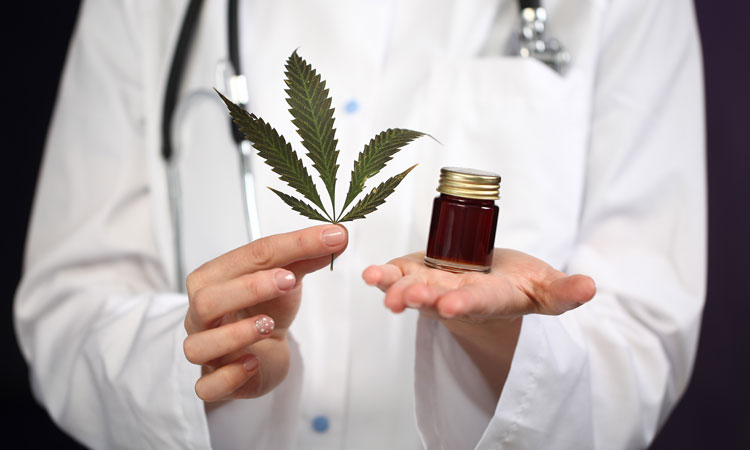The future of medical cannabis development in Europe
Posted: 13 July 2023 | Mikael Sodergren (Curaleaf International) | No comments yet
Dr Mikael Sodergren, Chief Medical Officer at Curaleaf International, discusses the challenges of developing and researching medical cannabis products and how the European medical cannabis ecosystem is well placed to overcome them.


In many European countries physicians can now prescribe medical cannabis for an array of chronic health conditions, including chronic pain, mental health disorders and neurological conditions.1,2 Yet the pace of adoption in Europe has notably lagged countries such as Canada, Australia and the US.1 In many countries, medical cannabis is only utilised as a therapy when licensed medications have proven ineffective.1,2 Moreover, except for countries such as Czechia, Denmark and Germany, the cost of these medications is borne by the patient, rather than national insurance or healthcare systems.1 Europe, however, is well placed to become a leader in driving the clinical translation of medications that display significant promise in laboratory-based studies.3
With established drug development pathways, we are accustomed to a rigid structure of translation from bench to bedside. While this is essential in the interrogation of novel compounds for which we know very little about their efficacy and safety, it is also true that some biomedical research is highly wasteful. It is estimated that only one in 10 drugs that enter Phase I trials are subsequently licensed by the US Food and Drug Administration (FDA).4 This is in addition to numerous compounds that are developed but either fail to demonstrate sufficient promise or pose potential health risks, meaning they never even enter Phase I trials.
Cannabis complications
There are notable complexities to researching medical cannabis using a linear approach to clinical translation.5 There is vast heterogeneity of products available to study owing to there being over 140 cannabinoids identified from the cannabis plant to date.5 These are each present at varying concentrations depending on underlying plant genetics and growing conditions.5 In addition, there is a vast range of flavonoids, terpenoids, phytols and other compounds present at lower concentrations within the cannabis flower.5 These compounds have been shown in pre-clinical studies to have an array of potential effects on the immune, nervous, cardiovascular, respiratory and endocrine systems.3 Moreover, some studies have suggested that co-administration of these compounds can modulate the effects of one another at a receptor level.6
There is vast heterogeneity of products available to study owing to there being over 140 cannabinoids identified from the cannabis plant to date
Medical cannabis can be manufactured into several formulations, including oils, dried flowers, capsules, suppositories and topical ointments. The method of administration of these medications affects how quickly they enter the blood stream and how they are metabolised.5 The complex nature of medical cannabis, therefore, means that while money can be invested into supporting a randomised controlled trial of a specific formulation, it is possible that a more suitable candidate may be overlooked. This could lead to significant research waste. Moreover, negative studies of one medical cannabis product are often inappropriately broadly applied to other formulations, potentially hindering research in this area.
Just an excuse?
The medical cannabis ecosystem in Europe is suited to weathering these challenges, given the long history of successful academic collaboration within biomedical sciences in Europe. The partnership of experts in medical cannabis with pre-clinical researchers in areas such as pain, headache and inflammation has already demonstrated success in elucidating the effects of the components of medical cannabis in petri dish models.7,8,9 This work will ultimately form the basis of our understanding of which combination of these compounds may make the best pharmaceutical agent to take forward into clinical trials for these disease areas.
In addition, European nations are well versed in the collection of real-world data in patient registries, which can be leveraged to inform the drug development process.5 When these medicines are prescribed to patients, we can use feedback from the real-world data that documents clinical outcomes, efficacy measures, patient-reported outcomes, and adverse events. An example of this can be found in the UK Medical Cannabis Registry, one of the largest real-world data sources globally on the outcomes of medical cannabis in patients.2 Data from this registry has helped to both uncover the types of individuals who are most likely to report improved outcomes after being prescribed medical cannabis, and also explore the response after being prescribed specific formulations.2,10 This data can help to inform the optimal drug candidates to take forward into clinical trials and inform pre-clinical research to iteratively develop medications for different clinical indications. This kind of feedback loop is unique in drug development, and it is one that can help overcome the inherent research challenges in developing and assessing cannabis-based medicines. This will lead to a higher proportion of these medicines becoming licensed, benefitting a larger number of patients.
The future of R&D of medical cannabis
The research and development of medical cannabis is still lagging globally due to many years of prohibitive red tape, which limited the type of research that could ultimately further our knowledge of this plant and its effects on certain chronic conditions. In the future, by adopting these novel approaches to drug development we may see an increase in the number of medications receiving market authorisation. It is therefore welcome that organisations such as the National Institute for Health and Care Research (NIHR) and the National Institutes of Health (NIH) have committed to increasing funding to advance research into these medications. Medical cannabis companies lack the resources of traditional pharmaceutical and biomedicine firms. There is consequently a need to foster collaborations and partnerships to continue to facilitate research in these areas, alongside adapting the traditional drug development pathway. Thankfully, the European medical cannabis ecosystem is well equipped to achieve this, as it is only improved research and education that will lead to better therapy access for patients.
About the author
Dr Mikael Sodergren MBChB (Hons), DIC, PhD, FRCS is the Chief Medical Officer at Curaleaf International. He leads the pre-clinical and clinical medical cannabis research programmes in Europe and is responsible for the cannabis clinic rollout across the continent. Dr Sodergren founded Sapphire Medical Clinics, which is the largest and highest rated medical cannabis clinic approved by regulators in the UK. He is also a Senior Clinical Lecturer and Consultant Hepatobiliary & Pancreatic Surgeon at Imperial College London.
References
- Attwood D, Curley A, Keenan E, Murphy S. The European Cannabis Report (7th Ed.). 2022. Available from: https://prohibitionpartners.com/reports/the-european-cannabis-report-7th-edition/ [Last Accessed: 31st May 2023]
- Olsson F, Erridge S, Tait J, et al. An observational study of safety and clinical outcome measures across patient groups in the United Kingdom Medical Cannabis Registry. Expert Review of Clinical Pharmacology. 2023 Mar 4;16(3):257-66.
- Mechoulam R. Plant cannabinoids: a neglected pharmacological treasure trove. British journal of pharmacology. 2005 Dec;146(7):913-5.
- Hay M, Thomas DW, Craighead JL, et al. Clinical development success rates for investigational drugs. Nature biotechnology. 2014 Jan;32(1):40-51.
- Banerjee R, Erridge S, Salazar O, et al. Real world evidence in medical cannabis research. Therapeutic Innovation & Regulatory Science. 2022 Jan;56:8-14.
- Anand U, Pacchetti B, Anand P, Sodergren MH. Cannabis-based medicines and pain: A review of potential synergistic and entourage effects. Pain Management. 2021 Jul;11(4):395-403.
- Anand U, Pacchetti B, Anand P, Sodergren MH. The Endocannabinoid Analgesic Entourage Effect: Investigations in Cultured DRG Neurons. Journal of Pain Research. 2022 Jan 1:3493-507.
- Greco R, Francavilla M, Demartini C, et al. Characterization of the biochemical and behavioral effects of cannabidiol: implications for migraine. The Journal of Headache and Pain. 2023 Dec;24(1):1-5.
- Cosentino M, Legnaro M, Luini A, et al. Effect of Cannabidiol on Cyclooxygenase Type 1 and 2 Expression and Function in Human Neutrophils. Cannabis and Cannabinoid Research. 2022 Aug 5.
- Tait J, Erridge S, Holvey C, et al. Clinical outcome data of chronic pain patients treated with cannabis-based oils and dried flower from the UK Medical Cannabis Registry. Expert Review of Neurotherapeutics. 2023 Apr 3;23(4):413-23.
Related topics
Cannabinoids, Clinical Development, Clinical Trials, Medical Marijuana, Research & Development (R&D)
Related organisations
UK Medical Cannabis Registry, US Food and Drug Administration (FDA)









